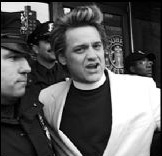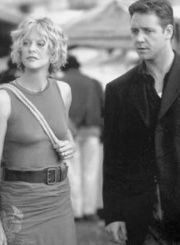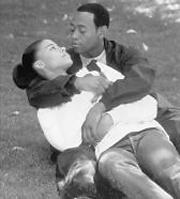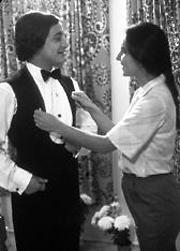MAKE WAY FOR Miramax’s holiday relief hitters: Lasse Hallstr�The Cider House Rules), Juliette Binoche (Oscar for The English Patient), and Judi Dench (Oscar for Shakespeare in Love) are batting cleanup after Bounce, the art film leviathan’s second-base hit. Chocolat is a lovingly constructed and altogether pleasant late-’50s fable that celebrates the power of chocolate as a symbol for sensual disinhibition. Vianne (Binoche) and her daughter Anouk (Ponette‘s Victoire Thivisol) blow into the French village of Lansquenet, a well-behaved little hamlet whose tightly wound Comte de Reynaud (a tragicomic Alfred Molina) presides over the townspeople like a parole officer.
CHOCOLAT
directed by Lasse Hallstr�ith Juliette Binoche, Judi Dench, Johnny Depp, Lena Olin, and Alfred Molina opens December 25 at Meridian and Guild 45th
Unmarried and bold enough to open a confectionery during Lent, Vianne has her work cut out for her as she meets the village’s cantankerous granny (Dench), her estranged daughter (Carrie-Anne Moss), the cagey housewife (Lena Olin, also Hallstr� wife), the lonely widows, estranged couples, and so on. Part clairvoyant, part chocolatier, Vianne has a knack for guessing her hesitant customers’ favorite treats, which release many a pent-up affection (to the dismay of the repressive Comte). The creamy middles really start oozing upon the arrival of an Irish gypsy (Johnny Depp) who is sympathetic to Vianne’s free spirit and further aggravates the Comte.
As with Like Water for Chocolate, Chocolat celebrates the carnal associations of food with tantalizing shots of dripping delicacies and ecstatic faces. Feeling blue? Bring on the candy! Performances are bittersweet and milky, while scenes are wrapped in beautiful cinematography. Although this is the kind of movie that makes adults coo, giggle, and say “yum” out loud, its charms are palatable without becoming syrupy. Hallstr�islays nothing in his simple juxtaposition of conservative airs and liberal impulses; the moral tale feels light on its feet rather than heavy-handed.
It’s especially nice to see Binoche and Olin together again (last paired in 1988’s The Unbearable Lightness of Being), while Dench gives another foolproof performance—has she ever not?—as the town crank who won’t let her years dampen her love of life. Shedding her Matrix leather and Red Planet space suit, Moss keeps her posture tight and low, both a rebel and shrinking violet to her mother’s brash candor. As the strict mayor, Molina creates a memorable portrait of a man whose insecurities manifest themselves in reactionary and dangerous ways. As is typical for Hallstr�even while the Comte is the villain, Chocolat keeps his humanity close by—he’s truly a bad guy you can care about.








